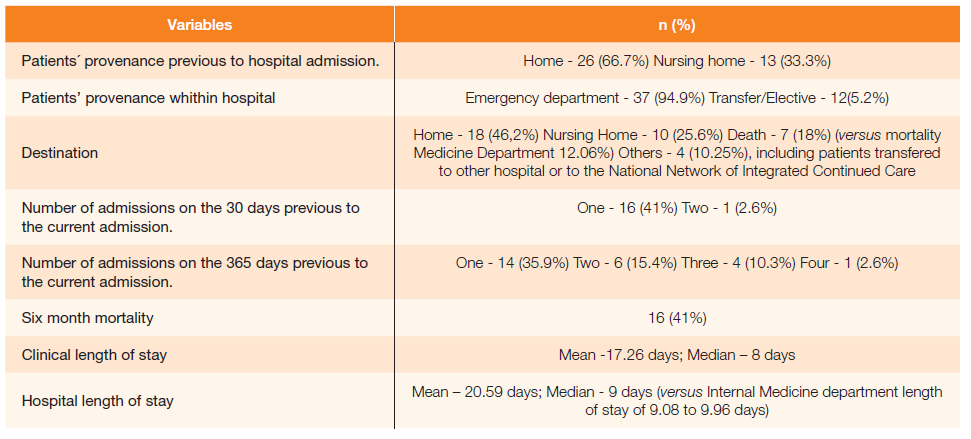Dear Editor
Between 2000 and 2014, the proportion of hospitalized patients with dementia increased 4.7 times in Portugal. It is estimated that 1 in every 5-6 inpatients has dementia.1 We developed a transversal, quantitative, descriptive, retrospective study that looked at patients with dementia admitted to an Internal Medicine Department. Similarly, the estimated prevalence of dementia was 17.4%. The 39 patients included were of advanced age, two-thirds with severe or very severe dementia and a high rate of comorbidities. Compared to their peers admitted to the same department, they presented a prolonged length of stay and increased mortality (Table 1).
Tabela 1: Institutional path of patients with dementia admitted to an Internal Medicine Department (n = 39).

It is therefore essential to question: are hospitals offering adequate care to these patients? Evidence shows that the hospitalization of patients with dementia has a high impact on their well-being and function. They also tend to undergo more invasive and potentially inappropriate interventions in this setting.2 In this context, the European Society for Palliative Care recommends that healthcare providers prudently consider transfer to hospital and the associated risks and benefits, acknowledging individualized goals of care and stage of dementia.3 The World Health Organization also advises to preferably administer care for people with dementia in the community, ideally within the family and cultural unit.2
For this to be possible, it is necessary to invest in decentralized solutions that respond to these patients´ most frequent medical problems, to the detriment of regular transfer to hospitals. We have examples such as strengthening home support networks, economic sustenance and training of informal caregivers, and the development of home hospitalization.
On the other hand, we must also develop alternatives to traditional acute care for patients whose hospital admission is inevitable, namely rethinking institutional culture, environment and outcome measurements. Developing specialized units within the acute hospital has shown positive results. These units would have environmental characteristics allowing safe and unrestricted walking and a welcoming atmosphere, additional professional presence with intensive staff training, and set daily activities to structure the day.4 Others have developed a dementia-friendly emergency department.5
Developing a comprehensive and integrated care net-work for people with dementia is urgent yet complex. It must start by knowing the needs and specificities of this growing population.
Declaração de Contribuição / Contributorship Statement:
Filipa Bianchi de Aguiar - Desenvolvimento e coordenação do projecto de investigação.
Cristina Carvalho Gouveia - Recrutamento de doentes, Recolha de dados, Revisão do artigo.
Carla Almeida Brito - Recolha de dados, Revisão do artigo.
Paulo Reis-Pina - Orientação do projecto de investigação, Revisão do artigo.















